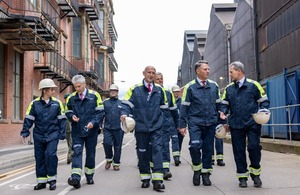New Defence Secretary sets out commitment to AUKUS to drive regional British growth
New Defence Secretary, John Healey, has set out Britain's commitment to the AUKUS partnership as an important driver of jobs and growth.

-
Defence Secretary and Australian Deputy Prime Minister tour UK military steel production plant.
-
Site supports hundreds of local skilled jobs with bright future under AUKUS.
-
Steel components from Sheffield to be used on future UK and Australian nuclear-powered submarines.
New Defence Secretary, John Healey, has set out Britain’s commitment to the AUKUS partnership as an important driver of jobs and growth in Yorkshire and across the UK.
Joined by the Australian Deputy Prime Minister and Defence Minister, Richard Marles, on a tour of a key military steel supplier in Sheffield, the pair saw first-hand how the business is benefiting from AUKUS – the trilateral defence and security partnership between the UK, US and Australia.
John Healey today reaffirmed the UK’s staunch commitment to AUKUS and the jobs and growth it can deliver for Britain.
The AUKUS submarine programme will generate 7,000 additional British jobs. At its peak, there will be over 21,000 people working on the SSN-AUKUS programmes in the UK supply chain.
The visit comes after Prime Minister Keir Starmer spoke to Australian Prime Minister, Anthony Albanese, with the leaders outlining their commitment to the strong AUKUS partnership.
Australia and the UK are close partners, working together on the most pressing global security issues. The two ministers also discussed UK-Australian cooperation to support Ukraine, our close coordination in the Indo-Pacific and our joint commitment to ensuring the AUKUS partnership fully delivers its potential.
Defence Secretary, John Healey said:
Working with allies and partners is fundamental to our security and so it is a pleasure to host my Australian counterpart within my first fortnight as Defence Secretary. The UK and Australia are the closest of friends and our work through AUKUS is testament to this.
Sheffield Forgemasters is a shining light of UK industry that helps boost global security and employs skilled staff from the local community. This is just one example of how our hugely important partnership with our Australian and American partners can help drive jobs and growth across Britain.
Sheffield Forgemasters manufacture specialist steel parts used in critical UK defence programmes, including highly complex, nuclear-grade steel components for nuclear-armed submarines. Their parts will also be used in future UK and Australian conventionally armed, nuclear-powered, submarines – known as SSN-AUKUS – which will be the largest, most advanced and most powerful attack submarines ever operated by the Royal Navy.
Deputy Prime Minister for Australia, Richard Marles said:
Australia and the United Kingdom’s relationship is enduring and forged in deep history.
Be it under the defence and security cooperation agreement, or the work we continue to achieve under AUKUS, we are modernising our partnership.
And importantly, we continue to work together on our support for Ukraine and to support a global rules-based order.
Opportunities through the AUKUS supply chain for British industry could be worth billions across the coming decades, supporting thousands of jobs in both countries.
Sheffield Forgemasters is fully owned by the Ministry of Defence, employing around 650 skilled workers, with more than £900 million invested to date to modernise and expand the business. Both the UK and Australian governments have made hundreds of millions of pounds of joint investment into the infrastructure and capability of the business. This investment shows the commitment both governments are making in the region and to the wider UK supply chain supporting the AUKUS endeavour. Latest statistics show £330 million is spent annually with the defence industry in Yorkshire & The Humber, with more than 2,500 jobs supported.
The tour at Sheffield Forgemasters followed Richard Marles visiting HMNB Clyde in Scotland to see first-hand how the UK operates its nuclear submarine base, including exposure to an Astute Class submarine and the UK approach to the operation, maintenance and regulation of these attack vessels.
Just last week the first three Royal Australian Navy officers graduated from the Royal Navy’s Nuclear Reactor Course at HMS Sultan in Gosport. The graduates will now go on to serve in Astute-class submarines side-by-side with the Royal Navy to gain first-hand at-sea experience with naval nuclear propulsion technology.
Their success marks a significant milestone in developing the skilled workforce needed to operate Australia’s future conventionally armed, nuclear-powered submarine capability being developed under the AUKUS partnership.